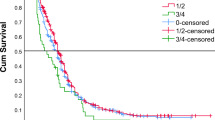Abstract
A number of prognostic factors have been reported to influence the probability of developing nausea and vomiting after cytotoxic chemotherapy. This study used data collected in four randomized anti-emetic trials conducted by the Clinical Trials Group of the National Cancer Institute of Canada (NCIC-CTG) to assess the consistency of the effects of these prognostic factors. A total of 582 patients, all of whom had received moderately emetogenic chemotherapy for the first time, but who were assigned to different anti-emetics, were included in the analysis. The major findings was that the probability of post-chemotherapy nausea and vomiting was much more strongly influenced by the type of chemotherapy given and the type of anti-emetic used than by patient (e.g., age, gender) or environmental (e.g., treatment location, time of administration) characteristics. Further, patient-related factors had different, and sometimes opposite, effects in different anti-emetic and chemotherapy subgroups. Finally, the relative potency of anti-emetics appeared to vary with chemotherapy regimens. Implications of these findings for future studies are discussed.
Similar content being viewed by others
References
Cohen RE, Blanchard EB, Ruckdeschel JC, et al (1986) Prevalence and correlates of posttreatment and anticipatory nausea and vomiting in cancer chemotherapy. J Psychosom Res 30:643–654
Fetting JH, Grochow LB, Folstein MF, et al (1982) The course of nausea and vomiting after high-dose cyclophosphamide. Cancer Treat Rep 66:1487–1493
Gail M, Simon R, (1985) Testing for qualitative interactions between treatment effects and patient subsets. Biometrics 41:361–372
Hesketh PJ, Gandara DR (1991) Serotonin antagonists: a new class of antiemetic agents. J Natl Cancer Inst 83:613–620
Hrushesky WJM, Roemeling R (1986) Chemotherpy-induced vomiting: circadian drug timing as a source of predictable within-patient variability. Cancer Treat Rep 70:1347–1348
Jones AL, Hill AS, Soukop M, et al (1991) Comparison of dexamethasone and ondansetron in the prophylaxis of emesis induced by moderately emetogenic chemotherapy. Lancet 338:483–487
Olver N, Simon RM, Aisner J (1986) Antiemetic studies: a methodologic discussion. Cancer Treat Rep 70:555–563
Osoba D, Erlichman C, Willan AR, et al (1988) Failure of methylprednisolone acetate to prolong the antinauseant effect intravenous methylprednisolone sodium succinate in patients receiving chemotherapy. Clin Invest Med 11:377–379
Osoba D, Erlichman C, Willan AR, et al (1986) Superiority of methylprednisolone sodium succinate over low dose metoclopramide HCL in the prevention of nausea and vomiting produced by chemotherapy. Clin Invest Med 9:225–231
Parikh PM, Charak BS, Banavali SD, et al (1988) A prospective, randomized double-blind trial comparing metoclopramide alone with metoclopramide plus dexamethasone in preventing emesis induced by high-dose cisplatin. Cancer 62:2263–2266
Pollera CF, Giannarelli D (1989) Prognostic factors influencing cisplatin-induced emesis. Cancer 64:1117–1122
Roila F, Tonato M, Basurto C, et al (1987) Antiemetic activity of high doses of metoclopramide combined with methylprednisolone versus metoclopramide alone in cisplatin-treated cancer patients. A randomized double-blind trial of the Italian Oncology for Clinical Research. J Clin Oncol 5:141–149
Rusthoven JJ, Pater J, Kaiser L, et al (1991) A randomized double-blinded study comparing six doses of batanopride (BMY-25801) with methylprednisolone in patients receiving moderately emetogenic chemotherapy. Ann Oncol 2:681–686
Warr D (1991) Selective 5-HT3 receptor antagonists: a novel class of antiemetics. In: Osoba D (ed) Effect of cancer on quality of live. CRC Press, Boston
Warr D, Willan AR, Fine S, et al (1991) A double-blind comparison of granisetron with dexamethasone plus prochlorperazine for the prevention of nausea and emesis due to moderately emetogenic chemotherapy. J Natl Cancer Inst 83:1169–1173
Willan AR, Warr D, Pater JL, Levitt M, Erlichman C, Osoba D (1991) Methodological issues and antiemetic studies. In: Osoba D (ed) Effect of cancer on quality of live. CRC Press, Boston
Author information
Authors and Affiliations
Rights and permissions
About this article
Cite this article
Pater, J., Slamet, L., Zee, B. et al. Inconsistency of prognostic factors for post-chemotherapy nausea and vomiting. Support Care Cancer 2, 161–166 (1994). https://doi.org/10.1007/BF00417474
Issue Date:
DOI: https://doi.org/10.1007/BF00417474




